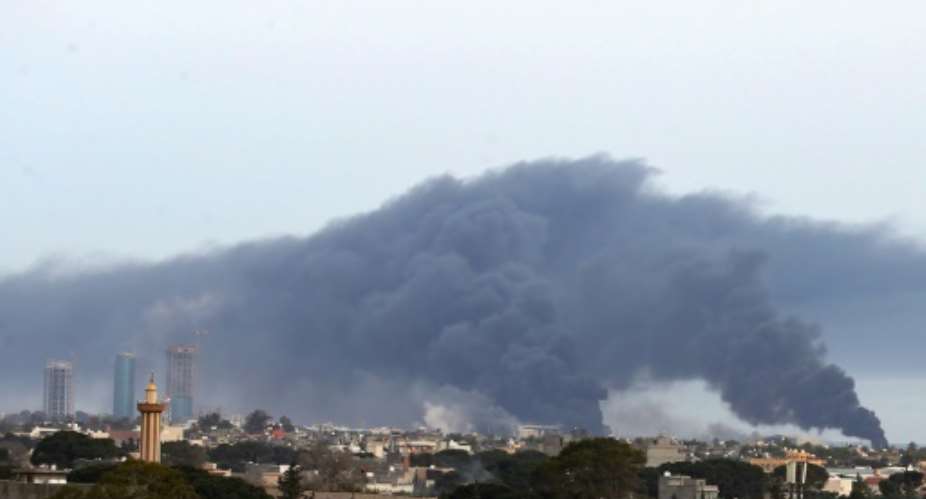French President Emmanuel Macron on Monday launched a furious attack on Turkey's conduct in Libya, accusing the key NATO member of playing a "dangerous game" that can no longer be tolerated.
In fierce comments likely to rile his counterpart Recep Tayyip Erdogan, Macron described Turkey's behaviour as a telling example of his controversial belief the military alliance was in the throes of brain death.
Ankara supports the UN-recognised Government of National Accord (GNA) in the conflict against rebel strongman Khalifa Haftar.
France is suspected by analysts of backing Haftar alongside Egypt, Russia and the United Arab Emirates, but insists it is neutral in the conflict.
"I believe today that Turkey is playing a dangerous game in Libya and is contravening all the engagements that it made at the Berlin conference" earlier this year on finding peace, Macron said after meeting Tunisian President Kais Saied in Paris.
Ankara's role, said Macron, threatened the interests of Libya, its neighbours, the entire region and also Europe.
Macron's comments came as a pro-government Turkish newspaper reported Turkey has arrested four of its nationals on suspicion of spying on conservative and religious groups for France.
"We will not tolerate today the role that Turkey plays in Libya," added Macron.
 Libya has been torn by violence since 2011. By Mahmud TURKIA (AFP/File)
Libya has been torn by violence since 2011. By Mahmud TURKIA (AFP/File)
In a sign of convergence between Paris and Cairo on the issue, Macron said he could understand the "legitimate concern" of Egyptian President Abdel Fattah al-Sisi, who has warned advances by Turkey-backed forces could prompt an intervention by Egypt.
"I don't want in six months, or one year or two, to see that Libya is in the situation that Syria is in today," said Macron.
Rising tensions
Libya has been torn by violence, drawing in tribal militias, jihadists and mercenaries since the 2011 toppling and killing of longtime dictator Moamer Kadhafi in a Western-backed uprising.
The oil-rich country is split between rival administrations in the east and west, with the conflict recently attracting increasing foreign involvement.
 French President Emmanuel Macron (C) and Tunisian President Kais Saied (L) discussed Libya. By Christophe PETIT TESSON (POOL/AFP)
French President Emmanuel Macron (C) and Tunisian President Kais Saied (L) discussed Libya. By Christophe PETIT TESSON (POOL/AFP)
Haftar, a former Kadhafi army commander, has been battling to take the capital Tripoli since last year.
Tensions have risen over the last year between Macron and Erdogan, notably when the French leader said the lack of NATO response to a unilateral Turkish operation in northern Syria showed the alliance was undergoing "brain death".
The Ankara-Paris strains soared further last week when France denounced an "extremely aggressive" intervention by Turkish ships against a French navy vessel participating in a NATO mission in the Mediterranean, a claim Ankara dismissed as "groundless".
Macron described this of fine proof of his concern for NATO.
"I refer you to my statements at the end of last year, on the brain death of NATO, I consider this to be one of the best demonstrations (of this)... when we have two NATO members" in a standoff, he said.
Turkish presidential spokesman Ibrahim Kalin on Saturday accused France of "supporting an illegitimate warlord and jeopardising NATO security."
Turkey has sent Syrian fighters, military advisors and drones in support of the GNA, in a deployment which has changed the course of the conflict, with Haftar's forces enduring a string of defeats.
Macron said he and Saied were urging the belligerent parties to down arms and honour their commitment under the UN to resume peace talks aimed at achieving "security of all, the reunification of Libyan institutions and reconstruction for the benefit of all Libyans."
"It is a difficult path that requires everyone to show proof of responsibility, stop the foreign interference and unilateral actions of those who claim to win new positions in the war," said the French president.





 There’s nothing you can do for us; just give us electricity to save our collapsi...
There’s nothing you can do for us; just give us electricity to save our collapsi...
 Ghanaian media failing in watchdog duties — Sulemana Braimah
Ghanaian media failing in watchdog duties — Sulemana Braimah
 On any scale, Mahama can't match Bawumia — NPP Youth Organiser
On any scale, Mahama can't match Bawumia — NPP Youth Organiser
 Never tag me as an NPP pastor; I'm 'pained' the 'Akyem Mafia' are still in charg...
Never tag me as an NPP pastor; I'm 'pained' the 'Akyem Mafia' are still in charg...
 Your refusal to dedicate a project to Atta Mills means you never loved him — Kok...
Your refusal to dedicate a project to Atta Mills means you never loved him — Kok...
 2024 elections: I'm competent, not just a dreamer; vote for me — Alan
2024 elections: I'm competent, not just a dreamer; vote for me — Alan
 2024 elections: Forget NPP, NDC; I've the Holy Spirit backing me and nothing wil...
2024 elections: Forget NPP, NDC; I've the Holy Spirit backing me and nothing wil...
 2024 elections: We've no trust in judiciary; we'll ensure ballots are well secur...
2024 elections: We've no trust in judiciary; we'll ensure ballots are well secur...
 Performance tracker: Fire MCEs, DCEs who document Mahama's projects; they're not...
Performance tracker: Fire MCEs, DCEs who document Mahama's projects; they're not...
 Train crash: Railway ministry shares footage of incident
Train crash: Railway ministry shares footage of incident
